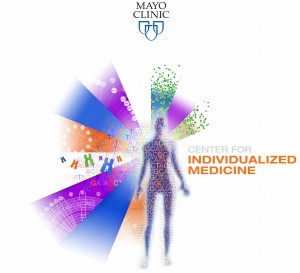-
Health & Wellness
Five Genomics Innovations from Mayo Clinic and the Mayo Clinic Center for Individualized Medicine
Individualized medicine, also known as personalized medicine or precision medicine, means tailoring diagnosis and treatment to each patient to optimize care. Patients have experienced this kind of care for 150 years at Mayo Clinic, where teams of specialists have always worked together to find answers.
Now, at a time when we can routinely sequence a whole human genome and better understand the function of genes, individualized medicine at Mayo Clinic has been taken to the molecular level. We're using genomics and other sequencing technologies to more effectively and precisely diagnose, treat, predict and eventually prevent disease.
And that's what the Center for Individualized Medicine is all about — solving the clinical challenges of today and tomorrow by bringing the latest discoveries from the research laboratory to your doctor's fingertips in the form of new genomics-based tests and treatments.
MEDIA CONTACT: Sam Smith, Mayo Clinic Public Affairs, 507-284-5005, newsbureau@mayo.edu
- The Individualized Medicine Clinic. For patients with particularly difficult cancers and people with rare and undiagnosed diseases, the Individualized Medicine Clinic uses whole exome sequencing to better understand tumors and disease mechanisms.
- Drug-Gene Alerts. Every time Mayo Clinic providers order a prescription for their patients, an automated safety system scours the medical record for potential adverse reactions or sub-optimal dosing based on the latest genomic information. Results suggest that providers alter dosage or find a substitute medication to improve patient safety and care efficiency. These rules are active for 12 common medications, including pain relievers and statins, with more currently under development.
- Predictive Genomics. A growing number of patients are participating in the Predictive Genomics Service of the Individualized Medicine Clinic, which helps patients and providers anticipate response to a variety of medications and the possibilities of disease onset later in life and in family planning.
- Laboratory testing. Lab-developed tests are improving care dramatically through Mayo Medical Laboratories. Examples include a new cancer test that evaluates 50 genes known to affect how patients respond to chemotherapy and the RAS/RAF Targeted Gene Panel Test by Next Generation Sequencing, which evaluates tumor mutations known to affect response or resistance to different chemotherapies.
- Breast Cancer Treatment. The Breast Cancer Genome-Guided Therapy (BEAUTY) Study uses several of the latest sequencing technologies and mice avatars to transform our understanding of breast cancer genomics and how the disease responds to chemotherapy. In addition to sequencing tumors before and after treatment, tumors are transplanted into mouse avatars that carry the individual patient's disease. Should a woman's cancer return after chemotherapy and surgery, researchers and physicians will use the avatars to identify the optimal treatment options for that particular patient.
Visit http://mayoresearch.mayo.edu/center-for-individualized-medicine/ for more information.
###
About Mayo Clinic
Mayo Clinic is a nonprofit organization committed to medical research and education, and providing expert, whole-person care to everyone who needs healing. For more information, visit http://www.mayoclinic.org/about-mayo-clinic or https://newsnetwork.mayoclinic.org/.
Related Articles







